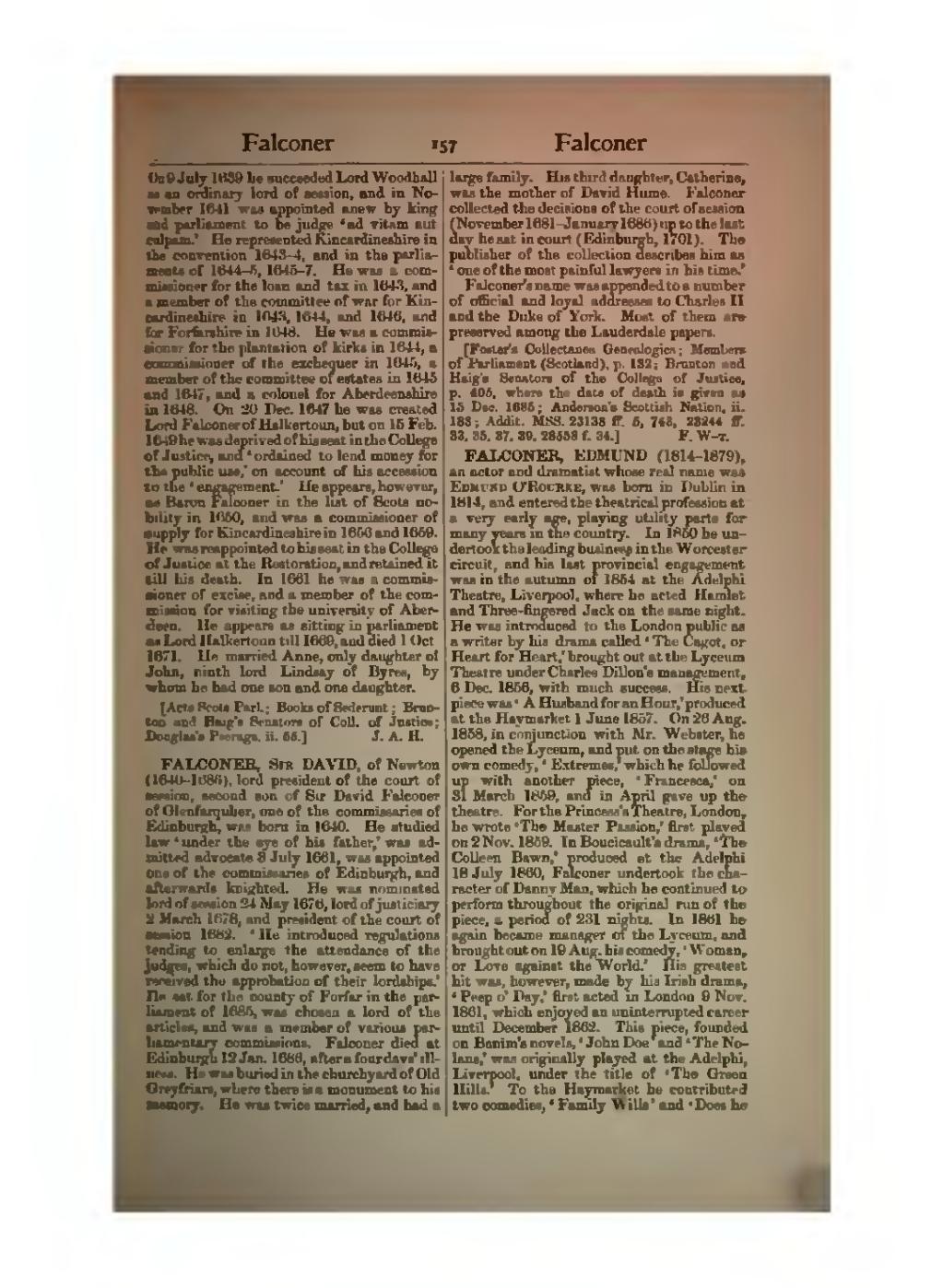On 9 July 1639 he succeeded Lord Woodhall as an ordinary lord of session, and in November 1641 was appointed anew by king and parliament to be judge ‘ad vitam aut culpam.’ He represented Kincardineshire in the convention 1643–4, and in the parliaments of 1644–5, 1645–7. He was a commissioner for the loan and tax in 1643, and a member of the committee of war for Kincardineshire in 1643, 1644, and 1646, and for Forfarshire in 1648. He was a commissioner for the plantation of kirks in 1644, a commissioner of the exchequer in 1645, a member of the committee of estates in 1645 and 1647, and a colonel for Aberdeenshire in 1648. On 20 Dec. 1647 he was created Lord Falconer of Halkertoun, but on 15 Feb. 1649 he was deprived of his seat in the College of Justice, and ‘ordained to lend money for the public use,’ on account of his accession to the ‘engagement.’ He appears, however, as Baron Falconer in the list of Scots nobility in 1650, and was a commissioner of supply for Kincardineshire in 1656 and 1659. He was reappointed to his seat in the College of Justice at the Restoration, and retained it till his death. In 1661 he was a commissioner of excise, and a member of the commission for visiting the university of Aberdeen. He appears as sitting in parliament as Lord Halkertoun till 1669, and died 1 Oct. 1671. He married Anne, only daughter of John, ninth lord Lindsay of Byres, by whom he had one son and one daughter.
[Acts Scots Parl.; Books of Sederunt; Brunton and Haig's Senators of Coll. of Justice; Douglas's Peerage, ii. 55.]
FALCONER, Sir DAVID, of Newton (1640–1686), lord president of the court of session, second son of Sir David Falconer of Glenfarquhar, one of the commissaries of Edinburgh, was born in 1640. He studied law ‘under the eye of his father,’ was admitted advocate 3 July 1661, was appointed one of the commissaries of Edinburgh, and afterwards knighted. He was nominated lord of session 24 May 1676, lord of justiciary 2 March 1678, and president of the court of session 1682. ‘He introduced regulations tending to enlarge the attendance of the judges, which do not, however, seem to have received the approbation of their lordships.’ He sat for the county of Forfar in the parliament of 1685, was chosen a lord of the articles, and was a member of various parliamentary commissions. Falconer died at Edinburgh 12 Jan. 1686, after a four days' illness. He was buried in the churchyard of Old Greyfriars, where there is a monument to his memory. He was twice married, and had a large family. His third daughter, Catherine, was the mother of David Hume. Falconer collected the decisions of the court of session (November 1681–January 1686) up to the last day he sat in court (Edinburgh, 1701). The publisher of the collection describes him as ‘one of the most painful lawyers in his time.’
Falconer's name was appended to a number of official and loyal addresses to Charles II and the Duke of York. Most of them are preserved among the Lauderdale papers.
[Foster's Collectanea Genealogica; Members of Parliament (Scotland), p. 132; Brunton and Haig's Senators of the College of Justice, p. 405, where the date of death is given as 15 Dec. 1685; Anderson's Scottish Nation, ii. 188; Addit. MSS. 23138 ff. 5, 743, 23244 ff. 33, 35, 37, 39, 28558 f. 34.]
FALCONER, EDMUND (1814–1879), an actor and dramatist whose real name was Edmund O'Rourke, was born in Dublin in 1814, and entered the theatrical profession at a very early age, playing utility parts for many years in the country. In 1850 he undertook the leading business in the Worcester circuit, and his last provincial engagement was in the autumn of 1854 at the Adelphi Theatre, Liverpool, where he acted Hamlet and Three-fingered Jack on the same night. He was introduced to the London public as a writer by his drama called ‘The Cagot, or Heart for Heart,’ brought out at the Lyceum Theatre under Charles Dillon's management, 6 Dec. 1856, with much success. His next piece was ‘A Husband for an Hour,’ produced at the Haymarket 1 June 1857. On 26 Aug. 1858, in conjunction with Mr. Webster, he opened the Lyceum, and put on the stage his own comedy, ‘Extremes,’ which he followed up with another piece, ‘Francesca,’ on 31 March 1859, and in April gave up the theatre. For the Princess's Theatre, London, he wrote ‘The Master Passion,’ first played on 2 Nov. 1859. In Boucicault's drama, ‘The Colleen Bawn,’ produced at the Adelphi 18 July 1860, Falconer undertook the character of Danny Man, which he continued to perform throughout the original run of the piece, a period of 231 nights. In 1861 he again became manager of the Lyceum, and brought out on 19 Aug. his comedy ‘Woman, or Love against the World.’ His greatest hit was, however, made by his Irish drama, ‘Peep o' Day,’ first acted in London 9 Nov. 1861, which enjoyed an uninterrupted career until December 1862. This piece, founded on Banim's novels, ‘John Doe’ and ‘The Nolans,’ was originally played at the Adelphi, Liverpool, under the title of ‘The Green Hills.’ To the Haymarket he contributed two comedies, ‘Family Wills’ and ‘Does he

